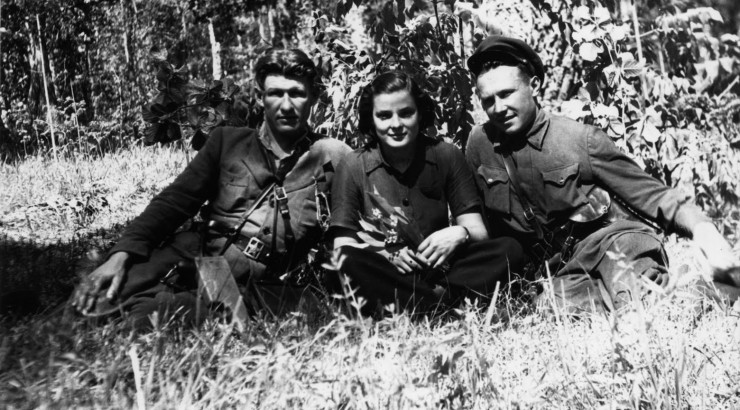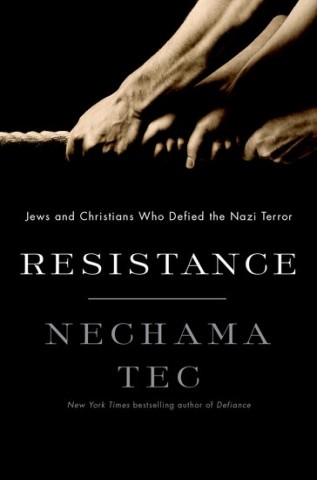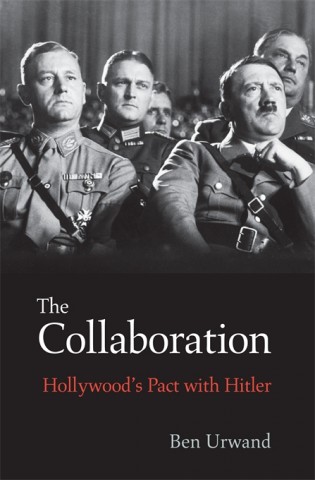
Collaboration and Resistance
September 11, 2013
From time to time, we’ll be bringing you reviews about books, films, and exhibits that we think may interest you. This week’s blog is by Jeff Koerber, research associate at the Rodgers Center and adjunct faculty member in the History Department.
During the Holocaust, non-Jews faced a choice: to collaborate with or to resist Nazi rule. Many European gentiles living under German occupation adopted an indirect but still morally compromising course, choosing partial accommodation to Nazi policies rather than total collaboration. Others joined resistance movements only after it was clear that the Allies were winning the war. Jews encountered a far narrower set of options, but some took the difficult path to confront Nazi oppression with armed opposition. Two recently-published books reexamine aspects of resistance and collaboration in light of new research.
 In her new book Resistance: Jews and Christians Who Defied the Nazi Terror, Holocaust survivor Nechama Tec, Professor Emerita of Sociology at the University of Connecticut at Stamford, examines the elements necessary for the emergence of effective opposition to German policies of annihilation. Her research confronts an old and controversial question: Why didn’t the Jews fight back? Tec’s previous work has included Dry Tears, her memoir of life as a child in hiding during the war; In the Lion’s Den, an examination of Jewish rescuer Oswald Rufeisen; and Defiance, a study of the Bielski brothers partisan group who rescued over 1,200 Jews in German-occupied Belorussia. (The latter, of course, was made into a feature film in 2008 starring Daniel Craig and Liev Schreiber.) Resistance was never as simple as picking up a gun; social cooperation, leadership, physical environment, and timing were factors more crucial than mere weaponry. As in her previous work, Tec’s scholarship features prominently the eyewitness accounts of survivors.
In her new book Resistance: Jews and Christians Who Defied the Nazi Terror, Holocaust survivor Nechama Tec, Professor Emerita of Sociology at the University of Connecticut at Stamford, examines the elements necessary for the emergence of effective opposition to German policies of annihilation. Her research confronts an old and controversial question: Why didn’t the Jews fight back? Tec’s previous work has included Dry Tears, her memoir of life as a child in hiding during the war; In the Lion’s Den, an examination of Jewish rescuer Oswald Rufeisen; and Defiance, a study of the Bielski brothers partisan group who rescued over 1,200 Jews in German-occupied Belorussia. (The latter, of course, was made into a feature film in 2008 starring Daniel Craig and Liev Schreiber.) Resistance was never as simple as picking up a gun; social cooperation, leadership, physical environment, and timing were factors more crucial than mere weaponry. As in her previous work, Tec’s scholarship features prominently the eyewitness accounts of survivors.
 As the second book listed below demonstrates, collaboration extended beyond the shores of continental Europe. In The Collaboration: Hollywood’s Pact with Hitler, Ben Urwand tells the story of the American film industry’s agreement during the 1930s to avoid producing movies that attacked German leaders or Nazi policies. Aspects of this story have been known for some time. Viewers of the documentary Imaginary Witness: Hollywood and the Holocaust (United States, 2004; Daniel Anker, director) will recall how the film touches on the issue of German influence in Hollywood, despite the fact that many of the studio heads were Jews themselves. What this new book brings forth is the breadth and depth of this collaboration. Among the shocking stories that Dr. Urwand, a Junior Fellow of the Society of Fellows at Harvard University, has uncovered with his research are the regular meetings that Hollywood studio representatives held with the German consul in Los Angeles that cemented the bonds of cooperation. Urwand’s book has received considerable press, and illuminates the need to look beyond the actors and actions that historians have traditionally held as their focus.
As the second book listed below demonstrates, collaboration extended beyond the shores of continental Europe. In The Collaboration: Hollywood’s Pact with Hitler, Ben Urwand tells the story of the American film industry’s agreement during the 1930s to avoid producing movies that attacked German leaders or Nazi policies. Aspects of this story have been known for some time. Viewers of the documentary Imaginary Witness: Hollywood and the Holocaust (United States, 2004; Daniel Anker, director) will recall how the film touches on the issue of German influence in Hollywood, despite the fact that many of the studio heads were Jews themselves. What this new book brings forth is the breadth and depth of this collaboration. Among the shocking stories that Dr. Urwand, a Junior Fellow of the Society of Fellows at Harvard University, has uncovered with his research are the regular meetings that Hollywood studio representatives held with the German consul in Los Angeles that cemented the bonds of cooperation. Urwand’s book has received considerable press, and illuminates the need to look beyond the actors and actions that historians have traditionally held as their focus.
Photo: Faye Schulman with two other Jewish resistance fighters in southwestern Belorussia during the war. Courtesy of the Jewish Partisan Educational Foundation.
Nechama Tec. Resistance: Jews and Christians Who Defied the Nazi Terror. Oxford: Oxford University Press, 2013.
Ben Urwand. The Collaboration: Hollywood’s Pact with Hitler. Cambridge, Massachusetts: Belknap Press, 2013.